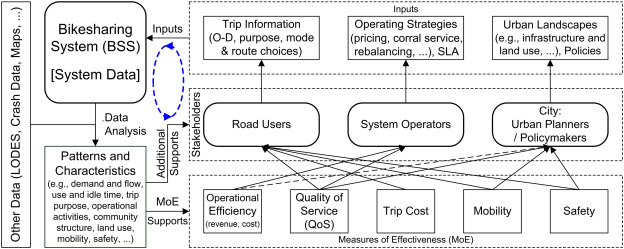Our work on bike sharing data analysis and implications for data-driven decision supports appears on Journal of Transport Geography.
Bikesharing has gradually become an adopted form of mobility in urban area recent years as one sustainable transportation mode to bring us many social, environmental, economic, and health-related benefits and rewards. There is increased research toward better understanding of bikesharing systems (BSS) in urban environments. However, our comprehension remains incomplete on the patterns and characteristics of BSS.
- “Examining travel patterns and characteristics in a bikesharing network and implications for data-driven decision supports: Case study in the Washington DC area,” Journal of Transport Geography, vol. 71, 2018.
![[PDF]](http://www.wiomax.com/wp-content/plugins/papercite/img/pdf.png)
![[DOI]](http://www.wiomax.com/wp-content/plugins/papercite/img/doi.png)
![[Bibtex]](http://www.wiomax.com/wp-content/plugins/papercite/img/bib.png)
@Article{Xie2018Bike, Title = {Examining travel patterns and characteristics in a bikesharing network and implications for data-driven decision supports: Case study in the {Washington DC} area}, Author = {Xiao-Feng Xie and Zun-Jing Wang}, Journal = {Journal of Transport Geography}, Volume = {71}, Pages = {84--102}, PDF={http://www.wiomax.com/team/xie/paper/JTRG18Pre.pdf}, Doi = {10.1016/j.jtrangeo.2018.07.010}, Year = {2018} }
 In this work, aiming to help improving sustainability in multimodal transportation through BSS, we perform a systematic data analysis to examine underlying patterns and characteristics of the system dynamics in a bikeshare network and to acquire implications of the patterns and characteristics for decision making. As a case study, we use trip history data from the Capital Bikeshare system in the Washington DC area and some additional data sources. The study covers seven important aspects of bikeshare transportation systems, which are respectively trip demand and flow, operating activities, use and idle times, trip purpose, origin-destination flows, mobility, and safety. For these aspects, by using appropriate statistical methods and geographic techniques, we investigate travel patterns and characteristics of BSS from data to evaluate the qualitative and quantitative impacts of the inputs from key stakeholders on main measures of effectiveness such as trip costs, mobility, safety, quality of service, and operational efficiency, where key stakeholders include road users, system operators, and city. We also disclose some new patterns and characteristics of BSS to advance the knowledge on travel behaviors. Finally, we briefly summarize our findings and discuss the implications of the patterns and characteristics for data-driven decision supports from the relations between BSS and key stakeholders for promoting bikeshare utilization and transforming urban transportation to be more sustainable.
In this work, aiming to help improving sustainability in multimodal transportation through BSS, we perform a systematic data analysis to examine underlying patterns and characteristics of the system dynamics in a bikeshare network and to acquire implications of the patterns and characteristics for decision making. As a case study, we use trip history data from the Capital Bikeshare system in the Washington DC area and some additional data sources. The study covers seven important aspects of bikeshare transportation systems, which are respectively trip demand and flow, operating activities, use and idle times, trip purpose, origin-destination flows, mobility, and safety. For these aspects, by using appropriate statistical methods and geographic techniques, we investigate travel patterns and characteristics of BSS from data to evaluate the qualitative and quantitative impacts of the inputs from key stakeholders on main measures of effectiveness such as trip costs, mobility, safety, quality of service, and operational efficiency, where key stakeholders include road users, system operators, and city. We also disclose some new patterns and characteristics of BSS to advance the knowledge on travel behaviors. Finally, we briefly summarize our findings and discuss the implications of the patterns and characteristics for data-driven decision supports from the relations between BSS and key stakeholders for promoting bikeshare utilization and transforming urban transportation to be more sustainable.
